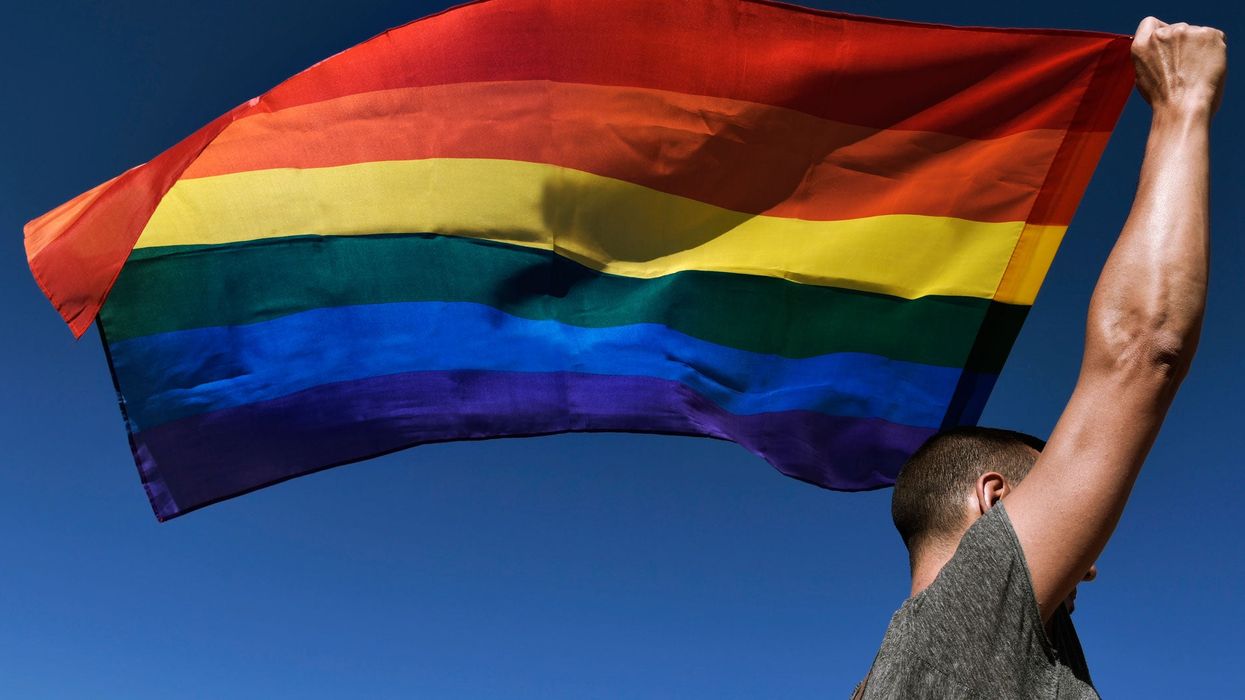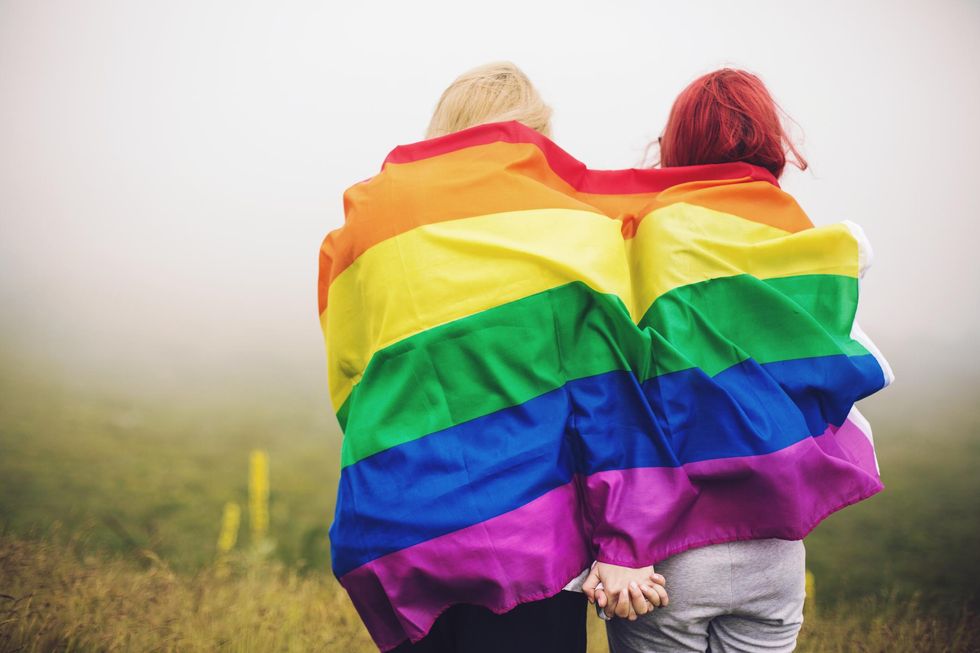News
Mimi Launder
Jul 03, 2018

Picture:
iStock / nito100
The government has been spurred into action after a survey exposed the horrifying prejudice and discrimination LGBT+ people face every day on the streets, at work and in healthcare.
More than two-thirds of LGBT+ people avoid holding hands with a same-sex partner in public, revealed the UK-wide survey, billed as the largest of its kind with more than 108,000 responses from the public.
At work, 23 per cent of respondents said people had reacted negatively to them being LGBT+, and more than half who accessed or tried to access mental health services said they had to wait too long.
Theresa May has rolled out the responding LGBT Action Plan promising "real and lasting change" to LGBT+ people's lives across the board. Within the dozens of pledges to reduce discrimination, health inequality and hate crime, we've picked out both the important bits and the most interesting reactions.
1. The government will ban gay conversion therapy.
Theresa May has vowed to eradicate the "abhorrent" practice of gay conversion therapy, the discredited and harmful 'gay cure' that aims to make gay people heterosexual or transgender people cisgender.
The survey found that the practice is more common that previously thought, after revealing 2 per cent of respondents had undergone conversion therapy and a further 5 per cent had been offered it by a range of faith organisations, healthcare providers and family members.
On the proposal, Laura Russell, head of policy at Stonewall, said there is still a long way to go:
We’re pleased the government recognises more needs to be done to tackle the deeply harmful practice of conversion therapy.
All forms of ‘therapy’ that attempt to change a person’s sexual orientation and/or gender identity are unethical and unacceptable.
2. It will work with the police force to improve responses to LGBT+ hate crime.
Two in five respondents said they had experience hate crime, while more than nine in ten said the most serious incidents remained unreported.
Extra work with the police will aim to improve how hate crime incidents are responded to and the recording of such crimes, as well as improving awareness of the services available for victims of sexual assault and domestic abuse.
The plan also aims to look at the worrying scale of LGBT+ abuse online, and combat homophobic, biphobic and transphobic bullying in schools.
Paul Twocock, director of campaigns, policy and research at Stonewall, welcomes the government commitment, but added:
We would also urge the government to respond to the Law Commission’s review into hate crime legislation as we need LGBT+ hate crimes to be treated with the same severity as those based on race and faith.
3. LGBT+ students and teachers will be better supported.
Nineteen per cent of those surveyed had experienced verbal harassment in an educational setting.
The action plan will introduce measures to improve diversity and tolerance, including an update to the guidance on relationships and sex education (RSE) in schools.
4. Trans people will be "treated with dignity and respect".
The survey showed trans people are dissatisfied with the gender recognition process.
At present, anyone wishing to transition must demonstrate they have lived as that gender for two years and secure the confirmation of a doctor specialising in gender dysphoria.
But the government is setting out to remove these bureaucratic blockages and the proposals confirmed they will commence "considering" alternatives. However, no concrete promises have been made.
Fifty nine per cent of trans respondents said they avoided being open about their sexual identity for fear of negative reaction, while 70 per cent of survey respondents said the same about their sexual orientation.

5. It will improve healthcare for LGBT+ people.
The improvements to healthcare will come with a focus of suicide prevention and mental healthcare, along with improved fertility services and gender clinics.
Though the plan promises to continue review the partial ban on gay and bisexual men donating blood, there were no specific commitments.
Likewise. NHS England will "consider the impact" of rolling out the HIV prevent drug PrEP to more people, but offers no further promises.
6. A new national LGBT+ health advisor role will be created.
Among the health proposals, a new national advisor will tackle the multiple ways that the health of LGBT+ people suffers more than that of heterosexual and will oversee better training for medical staff
7. There are mixed opinions on the plan.
Ruth Hunt, chief executive of Stonewall, recognised the"long way to go until we reach full equality". She continued:
We’re really pleased that the government is listening to the thousands upon thousands of LGBT+ people who responded to this survey and are investing funds in areas where LGBT+ people face some of the harsher inequalities, such as health care.
We now need people in all of Britain’s communities to also come out for LGBT+ equality and to stand up against the hate and abuse we face daily.
Theresa May said the action plan will "set out concrete steps to deliver real and lasting change across society" - and LGBT+ organisations and activists intend to hold her to her words.
Co-chairs of Pride in London, Alison Camps and Michael Salter-Church said it had taken too long to reach this point and pointed out the findings are nothing new, but added:
However, we welcome the scale of this research and that the government has committed to act on the results, but we now expect action to follow quickly.
The measures set out need to have real teeth and there is a danger that events such as Brexit could delay legislative progress.
In particular, Camps and Salter-Church are concerned that the proposals will not help everyone.
The prime minister and the minister both mention the UK’s global leadership on LGBT+ rights.
The truth of the matter is that other countries have overtaken us and there has been a failure to address fundamental issues in our country; the lack of equal marriage in Northern Ireland and cohesive relationship, gender and sex education being the most obvious.
The report acknowledges that the effectiveness of these proposals will also vary across the UK, as some policy areas it covers are devolved.
Human rights campaigner Peter Tatchell agreed the plan "is a welcome start but falls short on key issues", and is concerned about the proposal's "derisory and insulting" £4.5 million budget amid funding cuts are hitting sexual health clinics.
Tatchell also highlighted the lack of action or recognition of the government's treatment of LGBT+ refugees:
The biggest fail is the lack of any pledge to end the detention and deportation of LGBT+ refugees fleeing persecution in violently homophobic countries like Uganda, Iran, Russia, Egypt and Jamaica.
He also calls for the government to compensate gay and bisexual men convicted in the past for offences that once criminalised homosexuality:
Another big omission is the absence of any commitment to compensate gay and bisexual men who were convicted under past anti-gay laws.
They suffered greatly; frequently being hit with huge fines. Some were jailed and beaten in prison. They often lost their job, income and home.
Many suffered mental breakdowns. Their lives were wrecked for decades. The government's unwillingness to include compensation in its Action Plan is a huge let down.
More: LGBT+ groups debunk man who claims painkillers turned him gay
Top 100
The Conversation (0)













